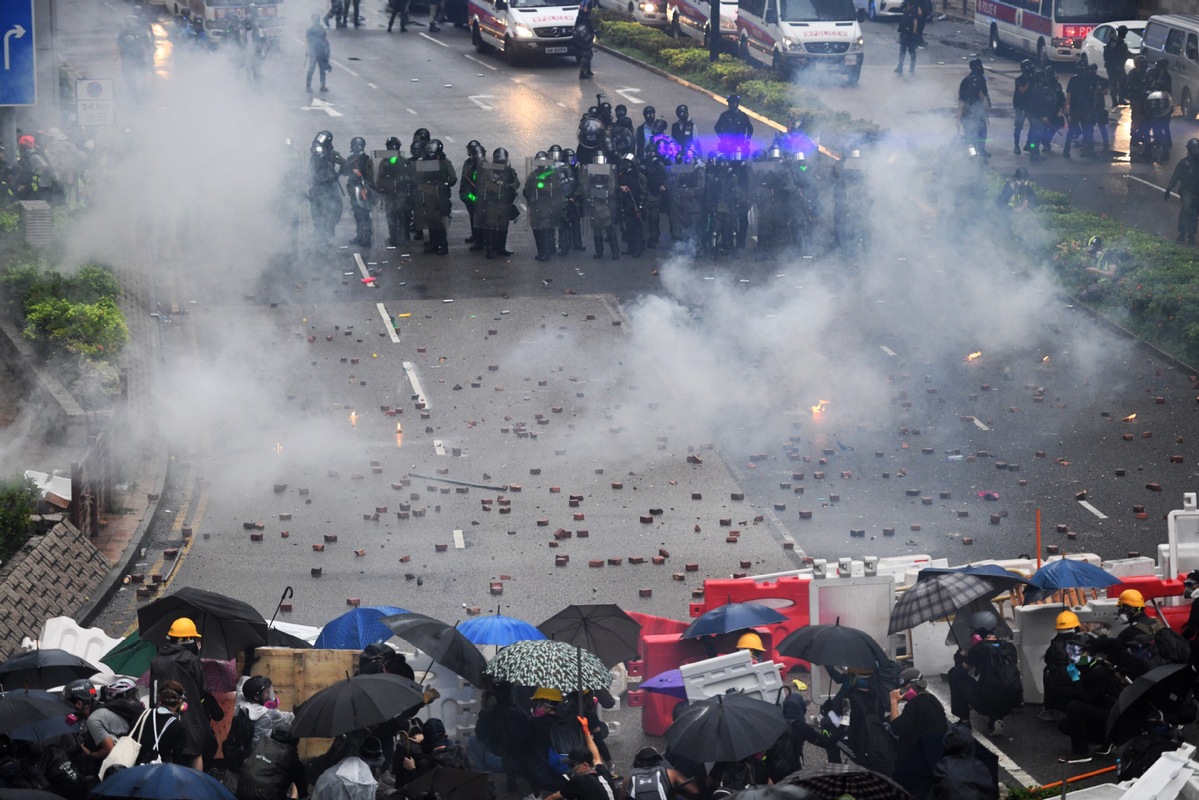HK courts have duty to help end the turmoil
By Tony Kwok | China Daily Global | Updated: 2019-08-26 09:43

Police have arrested a total of 753 people implicated in the recent spate of protest violence in Hong Kong. Among them, 117 have been charged with riot-related offenses.
It is surprising that the first conviction out of this lot was a Chinese mainland tourist who was sentenced to four weeks' imprisonment on Aug 19 for defacing the wall of the US Consulate in Hong Kong. Despite his claim that he was merely trying to show his discontent against foreign meddling in the anti-government protests by spray-painting the slogan, "China will win", on the consulate's front gate, Principal Magistrate Bina Chainrai stated, "That is really not a justification for the damage. It is not acceptable in this court."
I have two observations on this case. First, it refuted allegations made by the anti-government lawyers' groups that accused the Department of Justice of a "double standard", in that those arrested in the riot were quickly charged and taken to court, whereas those accused in gang fights in the Yuen Long station were only arrested but not prosecuted. The distinct difference is that those involved in the riots had been caught red-handed in the course of committing the crime. Hence, there is more than a prima facie case to take the violent rioters to court immediately. This is a demonstration of the proper exercise of the rule of law, in that offenders should be brought to court as soon as possible, in respect of the "justice delayed is justice denied" principle.
Regarding the Yuen Long gang assault, police were able to begin investigating afterward. So far, they have arrested 28 suspects, but understandably, it takes time to collect evidence against them.
The second observation is that the magistrate should be commended for setting a precedent for future trials in similar offenses. We have seen rioters spray-painting graffiti on buildings and public places in the past 10 weeks. They may think spraying a few words of discontent is no big deal. Now they should be worried they could be in jail and carry a criminal record for the rest of their lives.
One point that worries me most is that out of the 117 people charged, almost everyone was released by the court on bail pending their next court appearances.
This practice seems to defy some basic legal guidelines. The three important considerations are the seriousness of the offense, the likelihood of absconding, and the likelihood of repeating the crime while on bail.
First, the offenses these rioters were charged with are serious offenses that can bring a prison term of 10 years. Even those charged with possession of explosives and offensive weapons are released on bail. These offenses are punishable by up to 14 years in prison.
Second, there is every likelihood these suspects on bail may flee. The Wong Toi-yeung case is one such example. The magistrate granted bail to the main suspect in the Mong Kok riot, who was trying to evade arrest. He is now enjoying "political asylum" in Germany.
We have seen the leader of the rioters, who stormed the Legislative Council building, taking the first flight to the United States. His 30-odd followers sought asylum in Taiwan. At least two people charged with riot offenses have jumped bail.
Third, in the likelihood of the suspects repeating the offense, we have seen a recent case in which one person, who was on bail after assaulting a police officer in the Sha Tin riot, was rearrested on suspicion of assaulting a mainland visitor at the airport. Fortunately, the magistrate did not grant him bail this time.
Judges and magistrates should realize it is part of their duty to help Hong Kong overcome the current turmoil by ensuring rioters get their just deserts before the courts. They ought to have learned a lesson from the "Occupy Central" cases, where most defendants got away with light sentences.
Some of the main culprits received suspended sentences, while one was sentenced to 200 hours of community service. To add insult to injury to the judicial system, they expressed no remorse over what they had done.
Hence, I propose a special court for dealing with all the riot-related defendants, with judges and magistrates selected on the basis of their commitment to remaining apolitical.
The public should also consider launching a "court watch" on the internet to monitor these cases and publish their results, with reference to the respective magistrates and judges.
The courts have lost credibility over their handling of the "Occupy Central" cases. There was a saying at that time: "Police arrest, judges release." Hopefully, this folly will not be repeated when dealing with the current riot cases.
The author is an honorary fellow and adjunct professor of HKU Space, and was the first local head of operations of the Independent Commission Against Corruption.
























